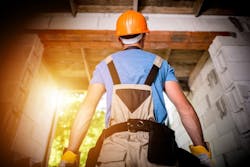Paycheck Protection Program: Builders Uncertain But Hopeful Pursuing Coronavirus Relief Loans
On Wednesday, March 25, in light of the increasing spread of the coronavirus in his state and nationally, Washington state Governor Jay Inslee declared residential construction, among other activities, nonessential, and that all work on those jobsites must cease immediately until April 6, at least.
By 7:30 p.m. that night, Heather Dosch, CEO of John Buchan Homes (JBH), in Seattle, knew she was going to have to make some difficult decisions about the company's employees, especially those working in the field. She says JBH was aware Inslee might declare construction nonessential, but "I couldn't picture my employees filing for unemployment the next day," she says. "Anyone who wasn't able to work remotely was given a two-week paid extension."
Though Dosch was able to stave off layoffs for a few weeks while evaluating the situation, she knew then that if the governor extended the stay-at-home orders (which is what occurred on April 2), JBH would have to enact some temporary layoffs in the coming days.
Builders Pursue CARES Act Coronavirus Relief Programs
The next steps for Dosch to help her JBH employees? Federal loan assistance through the CARES Act. Among economic relief for individuals, the CARES Act also authorizes small-business loans through lenders to help cover costs such as rent, as well as keeping employees on the payroll for up to eight weeks—even if the business operations are temporarily on hold—through the federal Paycheck Protection Program (PPP).
RELATED
- Daily updates on how the coronavirus is affecting the home building industry
The Act also relaxes requirements for Economic Injury Disaster Loans (EIDL), making the loan and a $10,000 loan advancement more accessible to most home building operations and similar businesses. Builders can find out if they are eligible by using this guide from the U.S. Chamber of Commerce.
Dosch has already applied for an EIDL and the $10,000 loan advancement. If approved for the PPP loan enabled by the CARES Act, she hopes to rehire some of the temporary layoffs she’ll make in the coming days by June 30th, the expected date for the PPP to evaluate if the company has been able to retain or rehire its staff.
Paycheck Protection Program Loans Could Help Builders Retain Employees
“If we don’t obtain that PPP loan, we'll be pushing out rehire dates and there would definitely be more employees who we would not be able to rehire [due to economic strain from a prolonged construction ban],” Dosch says. “Obviously, the economic impact will depend on how quickly we come out of this and how quickly we recover. That's yet to be determined. But certainly, having that Payroll Protection provides a big incentive to get those people back to full employment by June 30th.”
Dosch is betting on the PPP loan to help JBH sustain itself while they suspend construction and allow them to rehire employees once the ban is lifted. But unfortunately, she doesn’t think the PPP will be processed fast enough, so the team will most likely have to pursue temporary layoffs until the PPP and other assistance hits the company’s account. At her bank, she is behind almost 6,000 other applicants who filed before her even before the program started.
“If we don’t obtain that PPP loan, we'll be pushing out rehire dates and there would definitely be more employees who we would not be able to rehire.” Heather Dosch, CEO of John Buchan Homes, Seattle
“I don’t think we’re going to get any confirmation on that PPP loan by April 8th. If I did, I might make some different decisions, but I just don't think I’m going to have that assurance. I think at that point we’ll be laying people off,” Dosch says. “If that PPP comes through, then I know I’ll feel more comfortable starting to bring people back and that they can get themselves geared up so we can hit the ground running as soon as we know [the construction ban] is going to be lifted.”
When the funds do hit, however, Dosch says it will make a difference in how many employees she can hire back.
Optimism for Home Builders in Uncertain Times
Another builder, Jonathan Schoenheider, owner of Regency Builders, in Pewaukee, Wis., where residential construction is still considered an essential activity, also is applying for loans designated by the CARES Act in order to avoid layoffs and ensure his business loses as little ground as possible during the coronavirus pandemic. Though he has not had to lay off any employees, he is seeing delays in projects—a blow to his business, which was gearing up to grow through acquisitions.
“Every one of my trade partners is applying for this [PPP]," Schoenheider says. "I have one HVAC company with 65 employees that I had to talk off the cliff from laying them off. There’s work out there. It’s going to happen.”
Schoenheider knows work will pause as construction slows down, even in areas where it remains essential, but until then, he advocates for keeping up social distancing requirements, keeping jobsites clean, and trying to keep workers on board for when the economy starts up again.
RELATED
- If you're confused about your options, take a look at these six common questions and answers about the Paycheck Protection Program and other financial aid programs for some useful information, plus some tips from builders going through the process now.
